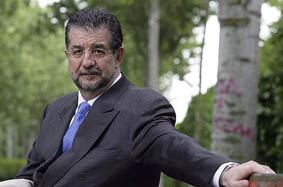
The philologist José Antonio Pascual, a member of the Real Academia Española, will offers tomorrow Tuesday in the University, 5 February, a conference entitled “La azarosa vida de las palabras”, on the occasion of the publication of his work “No es lo mismo ostentoso que ostentóreo’. The presentation, which has the collaboration of the publisher Espasa, will take place in the Sala de la Muralla of the Principal Peset Hall of Residence, at 19:30.
José Antonio Pascual was Full University Professor of Spanish Language at the University of Salamanca and after of the University Carlos III of Madrid. For several years he also held the position of director of the Cervantes Institute of Paris.
He is member of the Real Academia Española (seat K) since 2002, deputy director of the institution and director of the Nuevo diccionario histórico de la lengua española. Also is member of the Institut d’Estudis Catalans (1997) and honorary member of the Instituto Caro and Cuervo de Colombia. He was founder and first director of the Revista de la Sociedad de Lingüistica Aplicada.
Although he defines himself basically as “a lexicographer”, his knowledge and academic interests have been broad and diverse, from his first studies on translations (La Divina Comèdia attributed to Enric d’Aragó) to editions of works of his professors, as Luis Michelena or Joan Coromines. He worked with Coromines in the elaboration and final composition of the Diccionario critico etimológico castellano e hispánico.
His concern for dissemination led him to write an already famous high school manual. During the second half of the eighties was well known for his appearances in the television program Hablando Claro.
In 1973, he was awarded with the prize Conde de Cartagena of the Real Academia Española and, in 2006 the National Research Award Ramón Menéndez Pidal.
He recently published in the publisher Espasa No es lo mismo ostentoso que ostentóreo, an essay that records the hazardous history of some words and encourages not disheartening by mistakes committed when we speak or write.
Last update: 31 de january de 2013 09:21.
News release



















